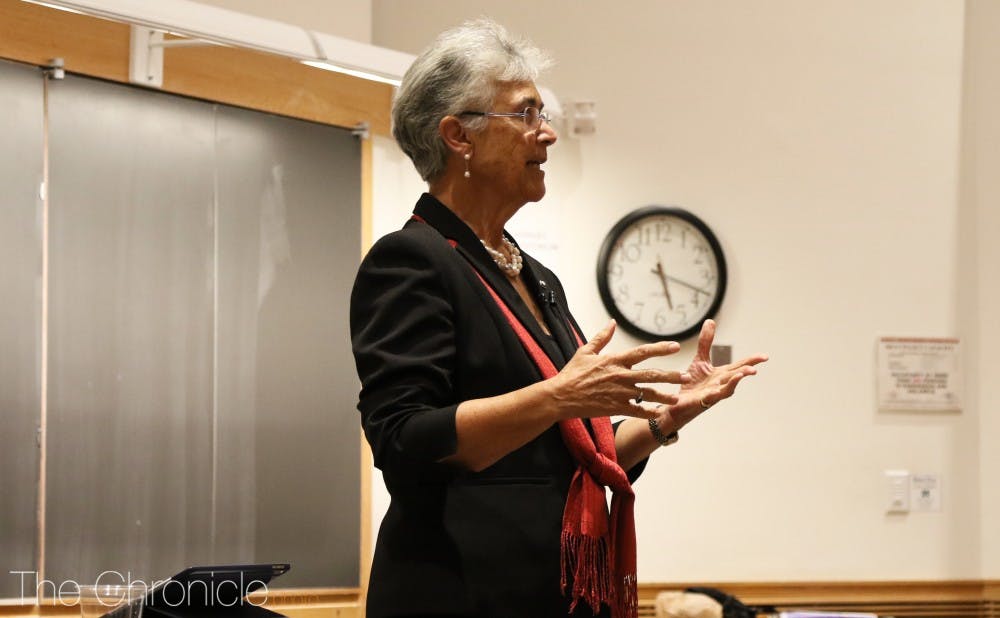Individuals should contribute to abating climate change and protecting wildlife, one environmental advocate said Thursday.
Yolanda Kakabadse, the former president of the World Wildlife Fund International from 2010 to 2017, spoke to students about her career during a lecture Thursday afternoon. The lecture is the first of a speaker series called "Innovation and Leadership in Latin America," launched by Duke’s Center for Latin American and Caribbean Studies.
“What we are doing is change—change attitudes, change visions, change perceptions," Kakabadse said.
Yolanda Kakabadse has been a global wildlife advocate since the late 1970s, devoting her career to promoting sustainable development and the conservation of biodiversity over the decades.
Before taking on her role in the WWF, Kakabadse founded Fundación Natura, a non-profit non-governmental organization dedicated to promoting sustainable development in Ecuador by addressing environmental policy and management.
Kakabadse and her colleagues in the organization launched a program to promote environmental conversation by educating young people. For the program, they composed an environmental profile of Ecuador, consisting of seventeen chapters about different issues, such as deforestation, water, oceans, food, species, legislation and institutionality.
A major part of the program was training teachers to creatively educate Ecuador's children on the environment around them, she said. Instead of using examples like “the house is green” to teach subject-verb agreement, they trained teachers to use “the hummingbird is Ecuadorian.”
Because of her work in Fundación Natura, in 1990 Kakabadse was recognized by the United Nations and moved to Geneva to help run sustainability efforts.
From 1990 to 1992, Kakabadse led the United Nations Conference on Environment and Development in Rio, Brazil, informally known as the Earth Summit. Five thousand NGOs and several world leaders attended the conference, discussing how to best promote conservation.
The conference was a major success since many leaders who were initially unfamiliar with the concept of sustainability achieved a more profound understanding of its importance, Kakabadse said.
However, Kakabadse also noticed one exception.
"There was a lot of excitement from leaders and people all over the world—except Latin America," she noted. "The conference was in Rio and I had thought that Latin America would be this strong participant that was active in this conference and I was wrong."
After the meeting, Kakabadse returned to Ecuador, endeavoring to bring Latin America into the international debate over sustainability and conservation.
Kakabadse served as Minister of Environment for the Republic of Ecuador from 1998 to 2000, during which she proposed sustainable policies on water, land use, the use of chemicals, national parks and protected areas.
One of the projects she worked on involved saving a unique species of turtles native to the Galapagos Islands from an erupting volcano. Under her instruction, the ministry sent helicopters and soldiers to relocate the turtles to higher places so that they would be safe from lava.
"The experience is beautiful because they were so proud of having saved those turtles from the volcano," she said. "The whole, ministry, the whole media was watching how the helicopter saved those turtles.”
Kakabadse was introduced to the World Wildlife Fund during her time as a minister, when the WWF funded many of Ecuador's sustainability programs and helped the country gain national and international recognition. During one of her meetings with the WWF, a member was impressed by Kakabadse's work and suggested that she should consider becoming president of the organization.
Later on, Kakabadse actually did become president of the World Wildlife Fund International, and the projects she led had major impacts on several populations of wildlife around the world. For example, she led a conversation project of wild tigers called Tigers Times Two. When the program began, there were more tigers in gardens in the U.S. than in the wild in Asia—5,000 and 3,000 respectively. Now, the population of wild tigers has nearly doubled.
Kakabadase emphasized that everyone has a role to play when it comes to environmental protection.
"The role that we have when facing change is anything and everything," she said. "You can be a passive observer, you can be an active driver of a message, you can be a strategic actor in changing things, you can be a visible one, you can be an invisible one. The role you can play in change is unlimited—in my life, I have played lots of roles.”
Get The Chronicle straight to your inbox
Signup for our weekly newsletter. Cancel at any time.

